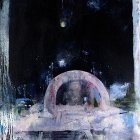Review | Daughter craft beautiful melancholy on Not to Disappear
Daughter![Disappear -Headstuff.org]()
Not to Disappear
[4AD]
‘Ethereal’ has become an umbrella term for a lot of contemporary alternative music. Björk is ethereal because she writes about the environment; PJ Harvey’s White Chalk is ethereal because it is ghostly and rueful. It’s a term that is often gendered and deployed lazily, but it seems perfect for Daughter.
The London trio have a lightness with which they address anxieties of twenty-something life. On their second album, the mind of frontwoman Elena Tonra has become an otherworldly echo chamber in which uncomfortable feelings can be examined without repercussion. Messy nights out, bad relationships and the unease of impending adulthood are monsters under the bed, and what’s striking about Not to Disappear is the paralysing sense of fear it carries throughout.
On ‘Smother’, a highlight of 2013’s When You Leave, Tonra sings of a place where all her limbs can become trees and her children can become her. It is a lyric that imagines Tonra as an atomic spec in the grand scheme of things, but also as a suffocating legacy for her children to escape. Those fears persist on Not to Disappear. If anything, they’re amplified.
‘Doing the Right Thing’ (concerning Alzheimer’s) and ‘Mothers’ regard motherhood and its outsized pressures with most obvious disdain. The former’s scorn is mitigated by the tragic inheritance being left to future generations, but the latter looks on the unborn child and sees nothing but a parasite (“You will drain all you need to drain out of me”). These thoughts are certainly unfiltered, but they do not sound barbed. The impact is softened by Tonra’s delivery (often airy, hesitant) and musical backing that is both reassuring and alluring. It’s a sparing palette of layered harmonies, electronics and guitars with little percussive heft to betray the band’s natural restraint.
[youtube id=”z-fD3PIRSO8"]
Not to Disappear is also characterised by a reticence to engage for fear of hurt and disappointment. ‘Numbers’ explores the alienating effects of a wild night with some of Tonra’s most succinct lyricism (“Chemically enlaced faces / Blackout nights and tight spaces”), while ‘Alone/With You’ and ‘Fossa’ find the same sense of isolation at the heart of a crumbling relationship. This combination of lacerating self-examination and cautious musical backing dominates, but there are a few concessions. ‘How’ come closest to a straight-up love song, although the love seems to be unrequited, while opener ‘New Ways’ reaches for anthemic peaks that the rest of the album has no interest in.
If you can levy a criticism at Not to Disappear, it is that Daughter have become too comfortable or averse to expanding their sonic template. Musically, the album is a bit thin, and Tonra’s crushing solipsism can become wearisome, although she rather hilariously subverts expectations when she says she should “get a dog or something” on ‘Alone/With You’. It’s a funny line that ultimately reinforces how dour the rest of the album is, however.
Not to Disappear may be somewhat repetitive, but Tonra and her bandmates, Igor Haefeli and Remi Aguilella, have clearly put great care into refining their sound over their two albums and should be applauded for the cohesion of their vision. Decorative touches such as the late rush of grating synths and warm brass of ‘Mothers’, or the wilting coos that adorn ‘Made of Stone’ make the album feel all the more lived-in, and mark Not to Disappear as a more consistent, confident and better album than its predecessor.
SEVEN / TEN


